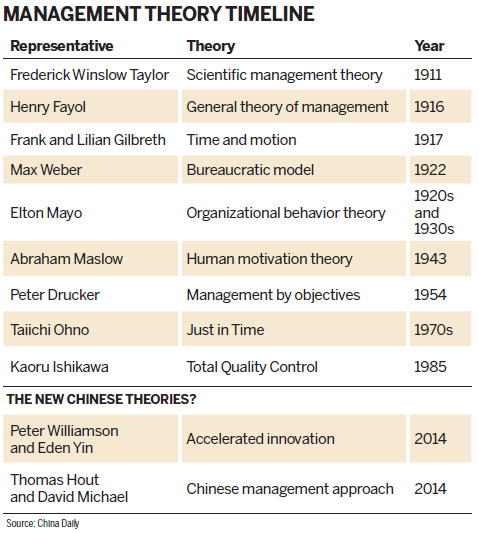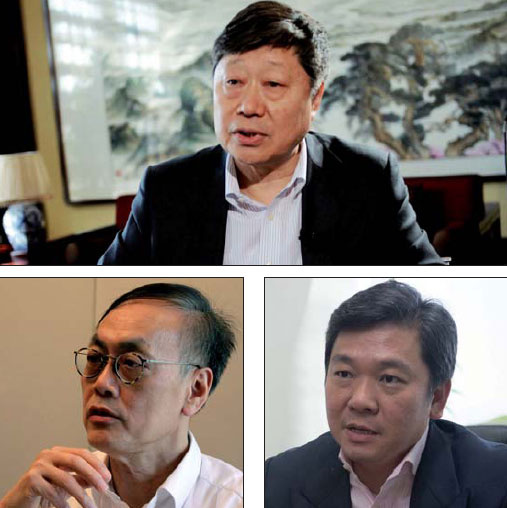Fresh ideas
Updated: 2014-12-05 11:20
By Andrew Moody(China Daily Europe)
|
|||||||||||
Fast-changing consumer market in China is spawning innovative management methods for domestic firms
Is China now at the vanguard of a management revolution?
Theories about how business organizations are managed over the past century have largely been of American or European origin.
The founding father of the new science of management was the American Frederick Winslow Taylor. His Principles of Scientific Management about making factories more efficient came at a time when Model-T Fords were rolling off the production line just before World War I.
Other giants in the field have been Frenchman Henry Fayol and his general theory of management; German sociologist Max Weber, who apart from writing about Chinese religions, was also interested in bureaucratic systems; and Peter Drucker, the leading modern thinker who came up with management by objectives in the 1950s.
This Western orthodoxy has only been challenged before by Japan. Just in Time was pioneered by Toyota in the 1950s and was about keeping stock levels for the production line at a minimum to reduce costs.
Total Quality Control was another concept about delivering long-term customer satisfaction that was attributed to Japanese organizational theorist Kaoru Ishikawa in the 1980s.
Now, management theory and practice is facing another assault from the East, according to leading management theorists.
Peter Williamson, professor of international management at Judge Business School at Cambridge University and who has years of experience working in China, co-authored an article with his colleague Eden Yin, Accelerated Innovation: The New Challenge from China? in the MIT Sloan Management Review earlier this year.
The article argues the Chinese have developed a new system of management using their huge reservoir of scientists and technicians to reduce some product development cycles from 10-15 years to just one to two years with enormous repercussions for industry.
Another article, A Chinese Approach to Management, in the Harvard Business Review by Thomas Hout at the Monterey Institute of International Studies and by David Michael of Boston Consulting (who himself spent a number of years in China) explores how Chinese managers have come up with a system to deal with perhaps the fastest moving consumer market in the world.
Both raise questions of whether Chinese companies are inventing radical new methods of business organization, which will not just be applicable to China in the future but will become universal concepts.
Certainly, a number of Chinese companies, including Alibaba, the Chinese e-commerce giant founded by Jack Ma and which had the largest IPO in history on the New York Stock Exchange earlier this year; Tencent, a Chinese company that operates the WeChat instant messaging service; and Haier, the electrical goods maker inspired by its chairman Zhang Ruimin, have been hotbeds of new ideas.
One who believes that management consultancies, in particular, need to pay more attention to what is happening in China is Edward Tse.
The former chairman of Booz & Co Greater China and author of the influential book The China Strategy, set up his own China-based management consultancy Gao Feng Advisory earlier this year.
Tse believes management theory has been in some form of time warp since the 1980s and is in need of an injection of new ideas.
"This is the paradox of the whole thing. In business schools in the US and around the world everyone is talking about the same sort of issues, the same sort of intellectual capital as they were 30 years ago," he says.
"The starting point is always (Harvard academic) Michael Porter's competitive strategy or core competence theory developed in the 1990s (by US academics C.K. Prahalad and Gary Hamel) and until now there hasn't been much progress."
Tse, who was speaking in a Starbucks at Liangmaqiao in Beijing among students who might easily be among the next generation of Chinese managers, believes the fast-moving developments in China will soon lead to a new management theory.
"It is a matter of codifying this new evidence into a management theory. Neither what has happened in China over the past five or 10 years nor, indeed, in Silicon Valley with the emergence of Facebook and Amazon has resulted in that but I think it will happen. What we have in China is a speed and intensity of change that is becoming something of a phenomenon."
Zhang Zhixue, professor of management at Guanghua School of Management at Peking University and one of China's top management schools, however, believes the classical management theories still hold and are still as applicable in China as elsewhere.
"I don't actually see any new theories coming from China that go beyond the mainstream theories from Europe and the United States," he says.
"When we talk about classical management theory we are still talking about Taylor's scientific management and the theories of (Henry) Fayol and Max Weber from Germany. They are still mainstream."
Zhang, who was speaking in one of the meeting rooms at the school's state-of-the-art campus, says that is not to deride some of the work on Chinese management that has taken place in China and elsewhere.
"Over the past two years you perhaps have a group of scholars who have started to move this way and to try and understand the unique aspects of Chinese management.
"Some Chinese management theory and practice might have Chinese tastes but I have not seen a theory that is totally Chinese. I also thought that about what the Japanese came up with in the 1980s. I think it added to the body of knowledge without actually changing it."
But what of the practitioners? Zhang Ruimin, who has turned Haier Group from being a loss-making, Qingdao-based, state-owned refrigerator manufacturer into the world's largest white good manufacturer in 30 years, is regarded as being one of China's leading entrepreneurs.
He believes that a company has to constantly adapt and innovate to stay ahead.
"One of the biggest differences is our ability to remake and overhaul ourselves. Many companies' ways of thinking and operating have ossified and become hard to change, especially their organizational structures," he told Strategy+Business, published by management consultants PwC last month.
"Those inside Haier, especially managers, understand that it's crucial that we adapt to the evolving needs of users and the changing market environment."
Zhang, 65, says this fast-moving culture is still not true of many Chinese companies.
"At Chinese companies, it's exceptionally hard to remove an executive who is not performing well, especially if they're in the mid to high levels of management. At Haier, we can make fast changes. We have responded to the changing environment by eliminating or adjusting more than half of the vice-president-level executive positions."
Jack Ma, the 50-year-old former English teacher who has created perhaps China's most iconic company Alibaba, has his own unique management philosophy and says it is a mix of Taoism, Buddhism, Confucianism and tai chi.
"In Taoism, the best leadership is not leading at all. If someone warns me about an employee who is trying to overstep me, I reply that I'm a teacher and that's the way it should be," he said in an interview at Washington University.
Tse at Gao Feng says he is skeptical about those who bring Eastern philosophy into trying to understand how Chinese management differs from that of the West.
"When people talk about Chinese management, they often pick something from Confucius 2,000 years ago or some other ancient stuff. They talk about yin and yang and it is all almost cliched.
"There might be some elements of that are true. I am not disputing that. The crucial point, however, is that the China context has changed over the past five or 10 years and it is the fast-moving China environment that is forcing private business entrepreneurs into doing something different. This is what is underpinning the theories about a new Chinese approach to management."
Eric Thun, Peter Moores associate professor in Chinese business studies at Said Business School at Oxford University, is also not convinced when Oriental mysticism is brought in to discussions about management.
"There is all this stuff that you can buy at airports about Confucius or Taoist approaches to management but I don't give too much credence to them," he says.
Like Williamson and Yin at Cambridge University, who believe there is something unique about Chinese management practice, Han Jian, associate professor of management at CEIBS, is primarily focused on the management of innovation.
She, however, believes that in the modern global context it is difficult to have a debate about differences between Western and Chinese management theories.
"I actually think in terms of management theory and best practice the national boundaries are actually blurring. It is difficult to say that this is typical of Chinese management practice and this other is something we learned from our neighboring countries. I am not a believer that there is some new Chinese business model," she says.
Han, who is based at CEIBS Beijing campus and was speaking in a cafe in the Oriental Plaza in Wangfujing, one of China's most exclusive retail complexes, says there is now an international pool of management ideas that those from individual countries can draw upon.
"I am not saying that the Chinese cannot contribute to this pool. I think they are doing this with their speed and flexibility and practices focused on market driven customer value."
Johnson Chng, managing partner in Greater China at international management consultants AT Kearney, concedes there are some interesting management ideas coming out of China but he does not think they are making the breakthroughs some think.
"I think we are far from them becoming universal concepts. Whether or not one day we will open the Harvard Business Review and read about some Chinese company doing certain things that goes in a case study of business practice, I don't know. We are not there yet though.
"By and large I think China is still a follower but it is very quick at copying and you do get some innovation from the copying process. But, by definition, if you are a copier someone is ahead of you."
James Heimowitz, managing director of New Frontier Advisors, a management consultancy in Beijing and also president of the New York-based China Institute in America, agrees that in terms of management the Chinese are improving and adapting existing models rather than creating something entirely new.
"This is not to underrate what the Chinese are doing. Improving and perfecting ideas often makes them easier to implement and replicate across a wide spectrum," he says.
"I think this is what Asia generally and not just China have been good at and it is something they are now applying to management techniques."
There is certainly interest among executives in the West wanting to find out more about management in China.
Guanghua School of Management is currently recruiting the intake for the second year of its international Guanghua-Kellogg EMBA program that it runs in conjunction with the Kellogg School of Management at Northwestern University. Just less than half of last year's students were from outside China.
Zhang at Guanghua, who is just back from doing a presentation to potential recruits at The Shard in London, says there is a lot of interest in what is happening in China.
"The people who come on the course want to know about Chinese leadership. They want to come to China because they either already have business here or plan to have in the future," he says.
Thun at Said Business School says what people can see in China now is companies managed in such a way that they can deliver a very flexible and fast response to market conditions.
"That firms are fast and flexible has given them a strong comparative advantage in many areas. However, whether this will result in the transformation of management practice around the world is a very different question."
One management technique in China is often for companies to launch products that are not fully market tested in order to respond to the fast-moving nature of the market.
This often results in products having to be refined as a result of market feedback, something that would horrify some executives in the West.
Thun believes this is one of the reasons why Chinese management practices might not be fully exportable to developed markets.
"This approach might be well-suited to other emerging markets which are also rapidly changing but I think it would be more problematic in Europe or the United States where consumers are likely to be less forgiving about product problems that are going to be improved down the road."
Han at CEIBS also believes such issues are important and may be the ultimate test as to whether new breakthrough management theories have emerged from China.
"I think there is no doubt that we in China have some very interesting contextual factors that might add to the richness of the development of management theory," she says.
"I hesitate, however, to say that the new ideas are robust enough to be applied in a different context such as in Western markets. I think that is the ultimate test and we may not be there yet."
andrewmoody@chinadaily.com.cn
|
Zhang Zhixue (left), professor of management at Guanghua School of Management at Peking University; and Han Jian, associate professor of management at CEIBS. Photos By Feng Yongbin / China Daily |
|
Clockwise from top: Zhang Ruimin, chairman of Haier; Johnson Chng, managing partner in Greater China at international management consultants AT Kearney; and Edward Tse, CEO of China-based management consultancy Gao Feng Advisory |

(China Daily European Weekly 12/05/2014 page6)
Today's Top News
US, Britain pledge to support Afghanistan
HK visit: A political kabuki
Ukraine unlikely to join NATO in near future
Hotpot chain to raise $129m
2014 likely to be record warmest year
Ukraine's ceasefire talks continue
China marks 1st Constitution Day
Outbound tourists hit record 100m
Hot Topics
Lunar probe , China growth forecasts, Emission rules get tougher, China seen through 'colored lens', International board,
Editor's Picks

|

|

|

|

|

|







